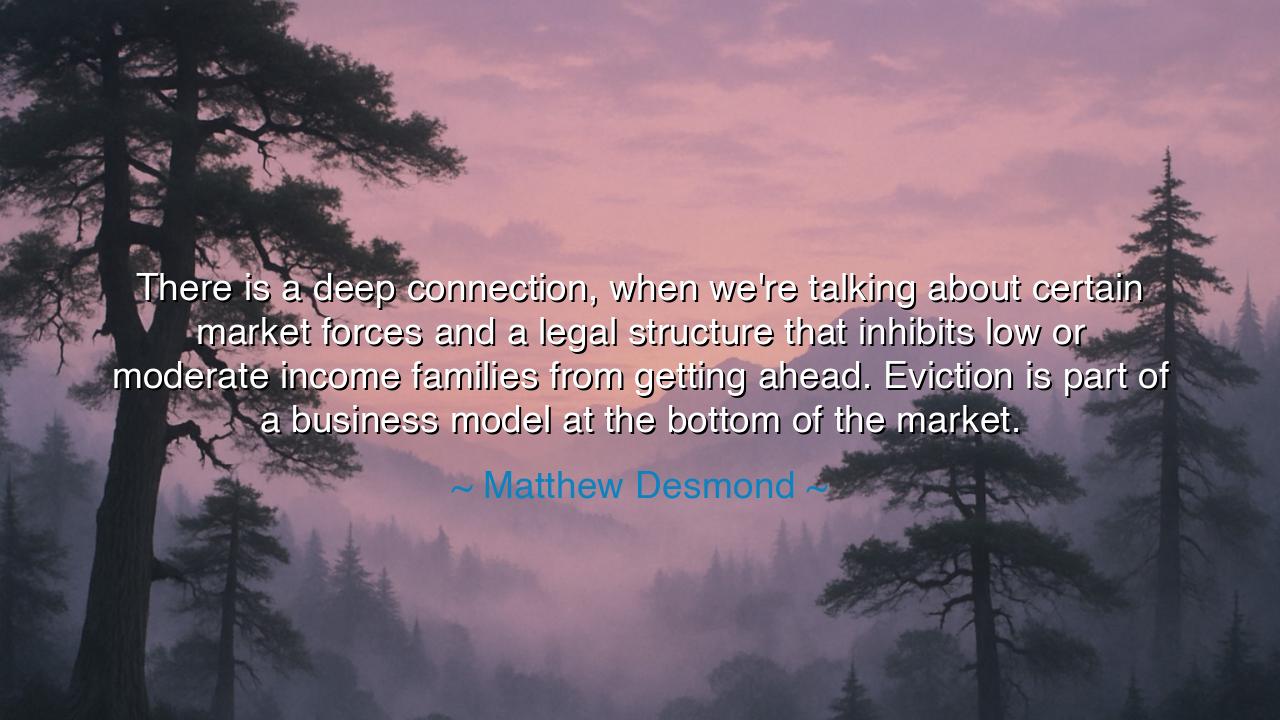
There is a deep connection, when we're talking about certain
There is a deep connection, when we're talking about certain market forces and a legal structure that inhibits low or moderate income families from getting ahead. Eviction is part of a business model at the bottom of the market.






The words of Matthew Desmond carry the weight of revelation: “There is a deep connection, when we're talking about certain market forces and a legal structure that inhibits low or moderate income families from getting ahead. Eviction is part of a business model at the bottom of the market.” Within this statement lies the recognition of a hidden injustice, a mechanism by which the vulnerable are systematically stripped of stability and opportunity. Desmond’s insight reminds us that law, economics, and morality are intertwined; where the legal and financial structures fail, human suffering is produced not by chance but by design.
The origin of this observation lies in Desmond’s decades of sociological research on housing instability in the United States, particularly chronicled in his seminal work, Evicted. Through painstaking documentation, he uncovers a brutal truth: eviction is not simply a social misfortune or an individual failure, but often a business strategy embedded in the rental market. Landlords and firms profit from the perpetual turnover and instability of those who cannot negotiate wealth or power, exploiting the legal system to maintain a cycle of dependency and precarity. In this, Desmond highlights a structural violence that is rarely visible to the prosperous.
Throughout history, similar dynamics have played out in civilizations that allowed the powerful to exploit the powerless under the guise of law. In feudal Europe, peasants were bound to the land, obligated to pay rents and taxes to lords who controlled the courts. When harvests failed or debts accumulated, peasants were evicted or imprisoned, often legally, and their labor and lives enriched the elite. Desmond’s words echo this ancient pattern: where market forces and legal frameworks intersect, the vulnerable are often ensnared, and profit is extracted at the expense of human dignity.
Eviction, as Desmond describes it, is more than the loss of a home; it is the rupture of stability, community, and opportunity. Families who are uprooted experience disrupted education, fractured social ties, and diminished prospects for upward mobility. The market, operating under legal permission, treats homes as commodities and tenants as transient numbers, rather than human beings with rights and aspirations. In this light, eviction becomes both an economic instrument and a moral failing — a legalized form of dispossession that perpetuates inequality.
Consider the story of a mother raising children in a low-income neighborhood, struggling to pay rent after a medical emergency. When she is evicted, the courts, the landlords, and the market converge to make her displacement legal and inevitable. She must move to a less secure area, children change schools, and her financial and social capital are diminished. This is not an isolated tragedy, but a pattern repeated in cities across America, illustrating Desmond’s claim that eviction is embedded in the business model at the bottom of the market, a systemic force rather than a series of random misfortunes.
Desmond’s insight also exposes the ethical failure of a society that tolerates these structures. Laws and policies are created ostensibly to protect citizens, yet they often shield landlords and businesses while offering minimal recourse to tenants. The market forces that maximize profit at the lower end of housing exploit the gaps in legal protection, transforming vulnerability into a commodity. Ancient philosophers, from Aristotle to Confucius, warned that justice is measured not in the wealth of the powerful, but in the protection of the weak — and eviction, as Desmond observes, violates this timeless principle.
The lesson is profound: economic systems and legal frameworks are not neutral; they embody values and priorities that shape the lives of the least powerful. To address structural injustice, one must examine both the law and the market. Policies that regulate rent, protect tenants, and provide avenues for stable housing are not acts of charity alone; they are necessary correctives to a system that otherwise perpetuates poverty and instability. Recognizing eviction as part of a business model is the first step toward reform.
So let the words of Matthew Desmond guide future generations: justice and prosperity are not achieved when the law serves only profit, nor when markets operate without ethical constraint. True civilization measures its strength by how it protects the most vulnerable, by how it ensures that families can build stability rather than live in perpetual displacement. Where legal structures and economic systems intersect, let them serve humanity — not exploitation — and let every eviction be seen not merely as an isolated event, but as a call to transform society itself.






AAdministratorAdministrator
Welcome, honored guests. Please leave a comment, we will respond soon